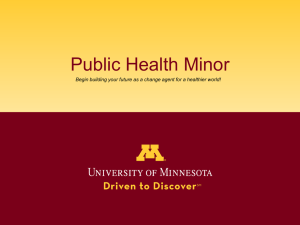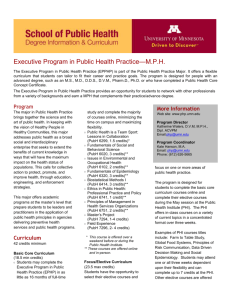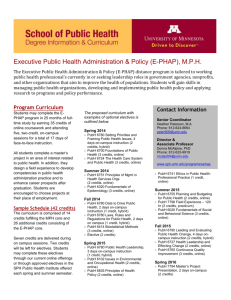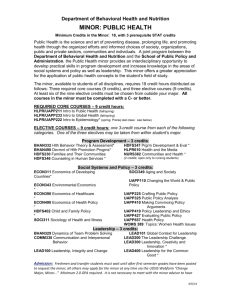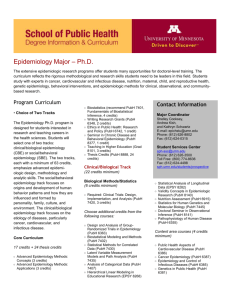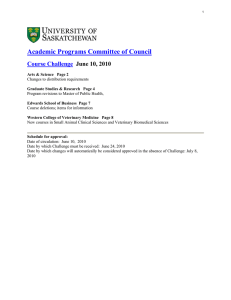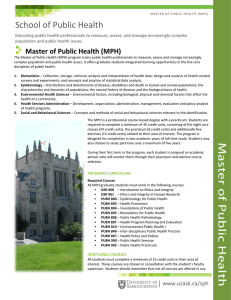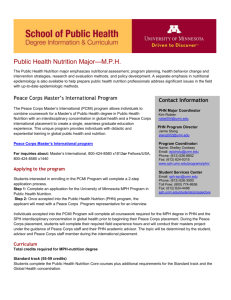PhD HSRPA - School of Public Health
advertisement
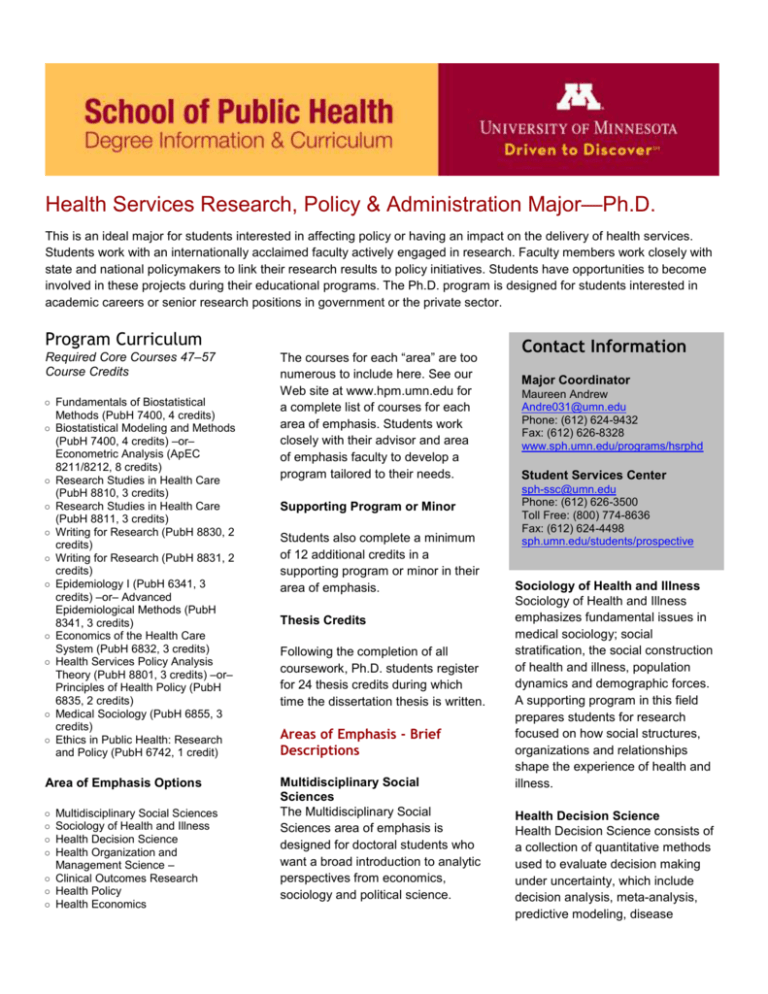
Health Services Research, Policy & Administration Major—Ph.D. This is an ideal major for students interested in affecting policy or having an impact on the delivery of health services. Students work with an internationally acclaimed faculty actively engaged in research. Faculty members work closely with state and national policymakers to link their research results to policy initiatives. Students have opportunities to become involved in these projects during their educational programs. The Ph.D. program is designed for students interested in academic careers or senior research positions in government or the private sector. Program Curriculum Required Core Courses 47–57 Course Credits ○ Fundamentals of Biostatistical Methods (PubH 7400, 4 credits) ○ Biostatistical Modeling and Methods ○ ○ ○ ○ ○ ○ ○ ○ ○ (PubH 7400, 4 credits) –or– Econometric Analysis (ApEC 8211/8212, 8 credits) Research Studies in Health Care (PubH 8810, 3 credits) Research Studies in Health Care (PubH 8811, 3 credits) Writing for Research (PubH 8830, 2 credits) Writing for Research (PubH 8831, 2 credits) Epidemiology I (PubH 6341, 3 credits) –or– Advanced Epidemiological Methods (PubH 8341, 3 credits) Economics of the Health Care System (PubH 6832, 3 credits) Health Services Policy Analysis Theory (PubH 8801, 3 credits) –or– Principles of Health Policy (PubH 6835, 2 credits) Medical Sociology (PubH 6855, 3 credits) Ethics in Public Health: Research and Policy (PubH 6742, 1 credit) Area of Emphasis Options ○ ○ ○ ○ Multidisciplinary Social Sciences Sociology of Health and Illness Health Decision Science Health Organization and Management Science – ○ Clinical Outcomes Research ○ Health Policy ○ Health Economics The courses for each “area” are too numerous to include here. See our Web site at www.hpm.umn.edu for a complete list of courses for each area of emphasis. Students work closely with their advisor and area of emphasis faculty to develop a program tailored to their needs. Supporting Program or Minor Students also complete a minimum of 12 additional credits in a supporting program or minor in their area of emphasis. Thesis Credits Following the completion of all coursework, Ph.D. students register for 24 thesis credits during which time the dissertation thesis is written. Areas of Emphasis - Brief Descriptions Multidisciplinary Social Sciences The Multidisciplinary Social Sciences area of emphasis is designed for doctoral students who want a broad introduction to analytic perspectives from economics, sociology and political science. Contact Information Major Coordinator Maureen Andrew Andre031@umn.edu Phone: (612) 624-9432 Fax: (612) 626-8328 www.sph.umn.edu/programs/hsrphd Student Services Center sph-ssc@umn.edu Phone: (612) 626-3500 Toll Free: (800) 774-8636 Fax: (612) 624-4498 sph.umn.edu/students/prospective Sociology of Health and Illness Sociology of Health and Illness emphasizes fundamental issues in medical sociology; social stratification, the social construction of health and illness, population dynamics and demographic forces. A supporting program in this field prepares students for research focused on how social structures, organizations and relationships shape the experience of health and illness. Health Decision Science Health Decision Science consists of a collection of quantitative methods used to evaluate decision making under uncertainty, which include decision analysis, meta-analysis, predictive modeling, disease simulation modeling, cognitive psychology, shared decision making, quality-of-life assessment, utility elicitation, health outcomes assessment, cost-effectiveness analysis, health economics, pharmacoeconomics, technology assessment, evidence-based medicine, medical informatics, and discrete event simulation. Health Organization and Management Science The HOMS core provides a theoretical foundation in organizational theory, organizational behavior, decision-making, and operations management, and assists in developing methodological skills in social networks and/or qualitative research. Clinical Outcomes Research Clinical Outcomes Research focuses on clinical care, costs and outcomes. Research may be conducted using observational (quasi-experimental) studies, randomized clinical trials or analyses of secondary data sets, including administrative data to expand understanding of how to measure outcomes of health care. Health Policy and Analysis Health Policy and Analysis is designed to prepare students for careers in research, teaching, and public service in academic, governmental and public policy settings. The focus of this area includes multidisciplinary training in the social sciences; application of quantitative research methods; rigorous writing and communication skill-based training. Students will receive the core doctoral-level training in health services research with an emphasis on U.S. health policy and applied policy analysis. Health Economics The goal of the Health Economics area of emphasis is to train health economists who will out-compete Ph.D.s from the top economics departments for all jobs except those in economics departments. The curriculum includes a broad menu of health economics related courses in addition to the multidisciplinary core courses. Dual/Joint Degrees The School of Public Health offers numerous joint and dual degree options in collaboration with schools and colleges across the University, including business, law, journalism, medicine, public policy, social work, and veterinary medicine. Admission Preferences and Prerequisites Admission requires a baccalaureate degree or higher from an accredited college or university. Admissions committees in each major review applicants according to their personal statements, background and experience, record of academic achievement, demonstrated academic potential, letters of recommendation, compatibility of interests with program faculty, and other factors. Test scores and GPAs provide competitive points of reference for admission but are not alone decisive in the admissions review. Preferred Performance Levels ○ A cumulative undergraduate GPA of 3.00. ○ A GRE score of 1200 combined verbal and quantitative, and 5.0 analytic writing assessment. ○ TOEFL scores of 600 on the paper test or 250 on the computer-based test or 100 on the internet-based (iBT) test for applicants whose native language is not English. ○ Prerequisites include calculus and statistics. Application Deadlines for Fall Admission Priority: Preceding December 1 Final: March 15 Admission Decisions Complete applications are reviewed on a rolling basis beginning in midJanuary by an admissions committee. Applicants are notified in writing by mail of the admissions decision.
